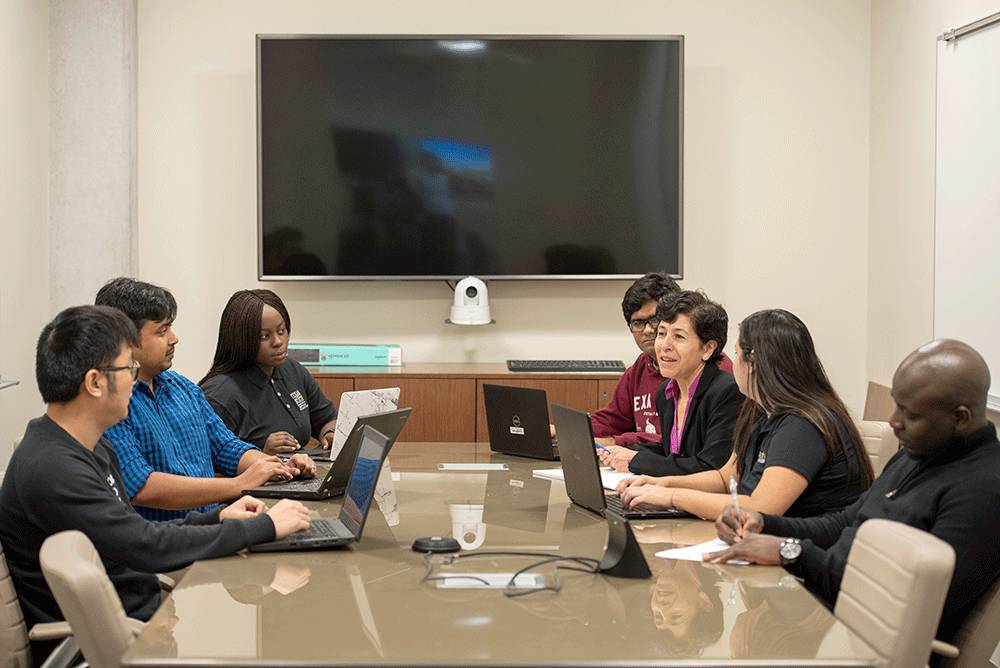Students develop multidisciplinary engineering skills with academic depth and industry driven application focus.
Engineering

Program Overview
The graduate program at the Ingram School of Engineering (ISoE) provides students with the necessary knowledge, skills, and practical experience to excel in the industry.
Our program emphasizes research and professional development, providing students with opportunities to engage in cutting-edge research projects, get certifications and attend training sessions that keep them at the forefront of their field.
ISoE has active Industrial Advisory Boards consisting of alums and representatives from the local industry, ensuring that our curriculum remains relevant, accredited, and meets the demands of the industry.
Course Work
The engineering program provides a practical, industry-driven focus with two options:
- Thesis: Focused on an academic research topic
- Non-Thesis: Directed research application, industry-driven project
Both options require a minimum of 31 credit hours with engineering and general courses, multidisciplinary electives, a seminar, and at least six hours of thesis or project work. The estimated time to complete the degree is 2-2.5 years.
| Degree | Concentration | Hours | Research Option | Location |
|---|---|---|---|---|
Degree M.S. | Concentration Civil Engineering | Hours 31 | Research Option Non-Thesis | Location San Marcos |
Degree M.S. | Concentration Civil Engineering | Hours 31 | Research Option Thesis | Location San Marcos |
Degree M.S. | Concentration Electrical Engineering | Hours 31 | Research Option Non-Thesis | Location San Marcos |
Degree M.S. | Concentration Electrical Engineering | Hours 31 | Research Option Thesis | Location San Marcos |
Degree M.S. | Concentration Industrial Engineering | Hours 31 | Research Option Non-Thesis | Location San Marcos |
Degree M.S. | Concentration Industrial Engineering | Hours 31 | Research Option Thesis | Location San Marcos |
Degree M.S. | Concentration Mechanical and Manufacturing Engineering | Hours 31 | Research Option Non-Thesis | Location San Marcos |
Degree M.S. | Concentration Mechanical and Manufacturing Engineering | Hours 31 | Research Option Thesis | Location San Marcos |
Program Details
Our engineering program is designed to produce highly qualified graduates with multidisciplinary theoretical and practical skills necessary to perform effectively in all professional contexts.
Program Mission
The mission of the Ingram School of Engineering is:
- To provide students with an exceptional education in various disciplines of engineering,
- To establish, through dedicated faculty, a nationally recognized research program, preparing interested students to achieve excellence in graduate studies and research, and
- To serve the State of Texas and the nation by creating highly skilled, diverse, and motivated professionals capable of technological innovation and dedicated to the improvement of society.
Career Options
Program graduates can embark on careers in industrial, service, and government organizations or continue to doctoral studies for academic and research careers. Our graduates work in a variety of career paths with distinguished alumni in:
- Amazon
- AMD
- Intel
- Lockheed Martin
- NXP Semiconductors
- Raytheon Technologies
- Samsung
- Tesla
Program Faculty
Our world-class faculty supervise graduate thesis and projects based on their cutting-edge research. Students of the program have access to a great portfolio of state-of-the-art equipment, instruments, and labs. The areas of impact are highly multidisciplinary, including:
- Sustainable/ renewable energy
- Next generation materials
- Industry 4.0, Digital Twins, and smart manufacturing
- Machine learning & loT technology
- Quality healthcare delivery
- Technology-enhanced infrastructure
- Smart Cities initiative including smart grids & mobility innovation
Contact us for general questions about your application, funding opportunities, and more. If you have specific questions after reviewing the program details, contact the program's graduate advisor.

Already know that Texas State is right for you?
Application Deadlines
-
For Entry Prior to Summer 2026
DEADLINES U.S. CITIZEN INTERNATIONAL Fall - Priority February 1 February 1 Fall - Standard June 15 June 1 -
Effective for Summer 2026 Entry and Beyond
DEADLINES U.S. CITIZEN INTERNATIONAL Fall - Priority February 1 February 1 Fall - Standard August 1 June 1
For important information regarding deadlines and decision timelines, review the Application Policy Information page.
Admission Requirements
The items required for admission consideration are listed below. Additional information for applicants with international credentials can be found on our international webpages.
-
Application
- completed online application
Review important information about the online application.
-
Application Fee
- $55 nonrefundable application fee, OR
- $90 nonrefundable application fee for applications with international credentials
Review important information about application fees.
-
Transcripts & GPA
- Baccalaureate degree in engineering, computer science, physics, technology, or a closely related field from a regionally accredited university. (Non-U.S. degrees must be equivalent to a four-year U.S. Bachelor’s degree. In most cases, three-year degrees are not considered. Visit our International FAQs for more information.)
- a copy of an official transcript from each institution where course credit was granted.
- A 2.75 overall GPA or a 2.75 GPA in your last 60 hours of undergraduate course work (plus any completed graduate courses).
Non-credit (leveling) course work may be required prior to admission into the program if you lack sufficient background course work. Any required leveling course work must be completed with grades of B or better prior to admission.
Review important information about transcripts. Official transcripts, sent directly from your institution, will be required if admission is granted.
-
Test Scores
GRE
- official GRE (general test only) with competitive scores in the verbal reasoning, quantitative reasoning and writing sections.
- Texas State University students with a GPA greater than 2.75 are exempt from this requirement.
Approved English Proficiency Exam Scores
Applicants are required to submit an approved English proficiency exam score that meets the minimum program requirements below unless they have earned a bachelor’s degree or higher from a regionally accredited U.S. institution or the equivalent from a country on our exempt countries list.
- official TOEFL iBT scores required with a 78 overall
- official PTE scores required with a 52 overall
- official IELTS (academic) scores required with a 6.5 overall and minimum individual module scores of 6.0
- official Duolingo Scores required with a 110 overall
- official TOEFL Essentials scores required with an 8.5 overall
This program does not offer admission if the scores above are not met.
Review important information about official test scores.
- official GRE (general test only) with competitive scores in the verbal reasoning, quantitative reasoning and writing sections.
-
Documents
- resume/CV detailing prior work experience, research experience, awards, scholarships, and other related qualifications
- statement of purpose (two pages) conveying your research interests, plans for graduate study, and professional aspirations
- two letters of recommendation from non-related individuals familiar with your scholarly work and/or relevant work experience
Review important information about documents.